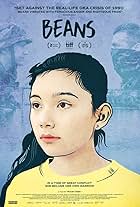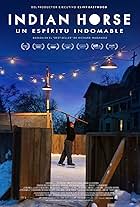Cree code talker Aline Spears survives her traumatic past in Canada's residential school system to continue her family's generational fight against systemic starvation, racism and sexual abu... Read allCree code talker Aline Spears survives her traumatic past in Canada's residential school system to continue her family's generational fight against systemic starvation, racism and sexual abuse.Cree code talker Aline Spears survives her traumatic past in Canada's residential school system to continue her family's generational fight against systemic starvation, racism and sexual abuse.
- Awards
- 35 wins & 25 nominations total
Phillip Forest Lewitski
- Adam Whallach
- (as Phillip Lewitski)
- Director
- Writer
- All cast & crew
- Production, box office & more at IMDbPro
Featured reviews
It's a drama about the Indian residential school system in Canada. It begins in Manitoba but includes Montreal, Toronto, and London, England. It extensively uses flashbacks from the 1880s, the 1930s to about 1970, and then to the Truth and Reconciliation Commission period.
The film details the multi-generational impact of the residential school system, using the family of a Cree woman, Aline Spears (Summer Testawich/Grace Dove/Carla-Rae). We see her happy early home life in an indigenous Catholic home, her removal to a residential school near Brandon, Manitoba, and her experiences there. Also taken to the school are her sister, Perseverance (Sierra Rose/Alyssa Wapanatâhk), and her brothers, Johnny (Ethan Evans) and Tye (Payne Merasty). We learn the impact of the school on all the Spears children, including Tye and Perseverance. Staff at the Catholic residential include Father Jacobs (Rémy Girard), Sister Ruth (Karine Vanasse), and Thomas Miller (Jonathan Whitesell/Patrick Garrow)
Interspersed are Aline's experiences in the Canadian Forces as a code talker who helped translate military messages transmitted in Cree back into English. We meet her Cree husband, Adam Whallach (Phillip Lewitski), who goes off to war simultaneously. The film shows his service's impact and his reception upon returning home after the war. We also meet Aline's children and see her participation in a First Nations visit to the Pope in 2009, with some startling revelations.
"Bones of Crows" is tough to watch. It reminded me of the film "Indian Horse," but it tries to pack in even more content, which leaves the viewer jerked about with the many storylines. However, it's also potent, especially in the Aline portrayed by Grace Dove. She is excellent, as is Michelle Thrush, who represents her mother.
A White Canadian can only feel shame leaving this film. The very prominent Christian cross is thoroughly sullied. I think "Bones of Crows" becomes too didactic at the end; it should have left the viewer to marinate in the story without the additional testimonies.
The film details the multi-generational impact of the residential school system, using the family of a Cree woman, Aline Spears (Summer Testawich/Grace Dove/Carla-Rae). We see her happy early home life in an indigenous Catholic home, her removal to a residential school near Brandon, Manitoba, and her experiences there. Also taken to the school are her sister, Perseverance (Sierra Rose/Alyssa Wapanatâhk), and her brothers, Johnny (Ethan Evans) and Tye (Payne Merasty). We learn the impact of the school on all the Spears children, including Tye and Perseverance. Staff at the Catholic residential include Father Jacobs (Rémy Girard), Sister Ruth (Karine Vanasse), and Thomas Miller (Jonathan Whitesell/Patrick Garrow)
Interspersed are Aline's experiences in the Canadian Forces as a code talker who helped translate military messages transmitted in Cree back into English. We meet her Cree husband, Adam Whallach (Phillip Lewitski), who goes off to war simultaneously. The film shows his service's impact and his reception upon returning home after the war. We also meet Aline's children and see her participation in a First Nations visit to the Pope in 2009, with some startling revelations.
"Bones of Crows" is tough to watch. It reminded me of the film "Indian Horse," but it tries to pack in even more content, which leaves the viewer jerked about with the many storylines. However, it's also potent, especially in the Aline portrayed by Grace Dove. She is excellent, as is Michelle Thrush, who represents her mother.
A White Canadian can only feel shame leaving this film. The very prominent Christian cross is thoroughly sullied. I think "Bones of Crows" becomes too didactic at the end; it should have left the viewer to marinate in the story without the additional testimonies.
I love the film. A part of the natives life from all over canada. It has to be told. Those people suffered a great deal. I lived in a cree/inuit village in northern Quebec. I know what they went thru. Awfull part of our history. But, the movie brings us back and forth in time from beginning to end. I really don't like that kind of structure. If you look at the series called "Pour toi Flora". It is more detailed, better structured and easier to follow. I gave 5 stars but if it wasn't from that structure problem, I would give a 8. This is the kind of movie, people can learn what really happened before. Lets all learn and make sure we are not still doing it, even now in 2023.
I saw this movie at Tiff last night. Wow, what a truly moving, emotional master piece. From the acting to storytelling to how it was edited this film is truly impactful. It brings insights into the brutal, horrendous acts carried about by the church on innocent young indigenous children who were taken from their homes and places in the residential school system. A dark history in Canada that NEEDS to be told. The performances from Grace Dove was powerful. I encourage anyone to go out and see this film. It was a movie that needed to made with a story that not everyone knows about. I am excited to see what Marie Clements next ventures are.
Okay it's quite sentimental, it's not always really goodly played and the structure is quite complex (it goes from a linear story line to cursive with plot twist and half a dozen story line to follow)
But! Scenery is beautiful, some photography and image composition deserve recognition, the stories told are touching and heartbreaking. The Mother-daughter feeling is well expressed to say the least.
It's long at moment and some scenes weaken the film but overall it's a touching film about a tragic subject, where people surprises you and the systemic endoctrination that autochtones preoples went trough will not live you impassible.
But! Scenery is beautiful, some photography and image composition deserve recognition, the stories told are touching and heartbreaking. The Mother-daughter feeling is well expressed to say the least.
It's long at moment and some scenes weaken the film but overall it's a touching film about a tragic subject, where people surprises you and the systemic endoctrination that autochtones preoples went trough will not live you impassible.
One has to feel sorry for that dark historical period, but it is somewhat unjust to focus on Canada only when this was done all over America...
Just Google "human-rights/residential-schools-in-canada-and-the-us"
"Efforts to eradicate indigenous culture in the US began early, with denominations of Catholicism and Protestantism creating missions focused on indigenous education starting in the 1600s. These missions, crafted to convert indigenous people into the Christian faith, burdened their students with unfair education and disproportionate labour."
"1879: A new system developed with the establishment of the Carlisle Indian Industrial School (1879-1918) in Carlisle, Pennsylvania. It was marked by its significance as the first federal off-reservation residential boarding school and further influenced the systems in Canada and Latin America with its philosophy of complete assimilation through cultural genocide and strict military discipline.
Like the missions before, the Carlisle school stripped its students of their indigenous culture by implementing strict rules stating that each student was to take up a colonist name, clothing, the English language, the puritan religion and cut their hair. Maintaining ties to their culture was strictly prohibited, and students would face corporal punishment for breaking these rules. In some cases, older students were forced to physically punish younger students."
Considering that "In the US, the Department of Interior has identified 53 burial sites and expects this number to grow with further investigations of the recognised 408 US boarding schools." chances are that Hollywood will be next to make movies on that subject...
Just Google "human-rights/residential-schools-in-canada-and-the-us"
"Efforts to eradicate indigenous culture in the US began early, with denominations of Catholicism and Protestantism creating missions focused on indigenous education starting in the 1600s. These missions, crafted to convert indigenous people into the Christian faith, burdened their students with unfair education and disproportionate labour."
"1879: A new system developed with the establishment of the Carlisle Indian Industrial School (1879-1918) in Carlisle, Pennsylvania. It was marked by its significance as the first federal off-reservation residential boarding school and further influenced the systems in Canada and Latin America with its philosophy of complete assimilation through cultural genocide and strict military discipline.
Like the missions before, the Carlisle school stripped its students of their indigenous culture by implementing strict rules stating that each student was to take up a colonist name, clothing, the English language, the puritan religion and cut their hair. Maintaining ties to their culture was strictly prohibited, and students would face corporal punishment for breaking these rules. In some cases, older students were forced to physically punish younger students."
Considering that "In the US, the Department of Interior has identified 53 burial sites and expects this number to grow with further investigations of the recognised 408 US boarding schools." chances are that Hollywood will be next to make movies on that subject...
Storyline
Did you know
- TriviaAt one point in the film, Prime Minister John A. MacDonald is quoted to justify the starvation of Indigenous children held in residential schools. In 1882, MacDonald gave a speech in the House of Commons where he addressed the systematic starvation of Indigenous populations who relied on rations from the Canadian government. In MacDonald's words, "I have reason to believe that the agents as a whole ... are doing all they can, by refusing food until the Indians are on the verge of starvation, to reduce the expense."
- How long is Bones of Crows?Powered by Alexa
Details
- Release date
- Country of origin
- Official site
- Languages
- Also known as
- L'ombre des corbeaux
- Filming locations
- Victoria, British Columbia, Canada(Various Locations)
- Production companies
- See more company credits at IMDbPro
Box office
- Budget
- CA$19,000,000 (estimated)
- Runtime2 hours 4 minutes
- Color
Contribute to this page
Suggest an edit or add missing content































